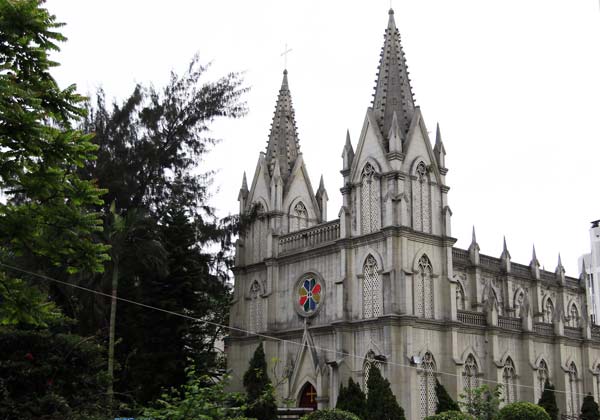Uncovering a city's past
Updated: 2013-04-25 03:02
(China Daily)
|
|||||||||||
|
 |
|
A Catholic church, built in 1902, remains in use in Zhanjiang, as an example of the city's colonial-era architecture. Zou Zhongpin / China Daily |
Guangzhouwan, a former treaty port in Guangdong province, features early 20th-century French architecture that tells of its storied past. Li Wenfang takes a closer look.
Researching the history of Guangzhouwan during its French occupation can easily provide material for a hundred doctorate degrees. At least this is what He Jie, a local journalist and head of the society being built on such research, believes.
Guangzhouwan once referred to an area made up of a few villages on Guangdong province's Nansan Island. It is now part of the city of Zhan-jiang, located in the southwestern part of the province.
The name Guangzhouwan, also spelled Kwangchowan, was adopted when 518 sq km of land and some of its surrounding sea, was leased by the Qing Dynasty (1644-1911) to France in 1899. In 1943, it was occupied by Japan, and two years later returned to China, after which it was renamed Zhanjiang.
Guangzhouwan's colonial history has been largely "covered in dust" and deserves attention from Chinese scholars, He says.
Previous Chinese studies on Guangzhouwan merely focused on the Chinese resistance to French invaders, says Ye Caiping, former deputy curator of the Zhanjiang Museum.
Guangzhouwan became a duty-free port in 1912. The French designed it to counter the growing power of neighboring Hong Kong, then under British rule, He says.
Its once vibrant foreign trade — reaching a peak of 160 million francs in 1916, as a French general put it in his memoir — is only the tip of Guangzhouwan history's iceberg.
After the War of Resistance against Japanese Aggression broke out in 1937, it remained the only free port connecting China with the rest of the world, and its business thrived.
Wen Yiduo, a contemporary Chinese poet, included Guangzhouwan in his famous poem Songs of Seven Sons. Written in 1925, the poetry talked about the seven places along the Chinese coast ceded to foreign powers and how the Chinese longed for their return to the motherland.
But at the same time, people realized foreign occupation also brought new ideas into China.
"The French leasing Guangzhouwan was indeed an act of invasion, which deserved the resistance of our nationals. But they also brought in Western culture, which deeply influenced the lives of people living in the leased area," Zhu Yu, a former director of Zhanjiang's bureau of culture, wrote in his preface to a book on contemporary buildings in Zhanjiang, published last year.
Zhu mentioned Guangzhouwan's hospital built in 1922, as well as its first power plant, constructed in 1927.
"A city without history is pitiable. Buildings record the history of a city, show historical development and witness social development," he wrote.
"Through buildings, the elderly recollect past lives, while the young get to know history to better steer the future."
Many books and papers on Guangzhouwan can be found in libraries in France, but translating them will be a mammoth task, Ye says.
A visitor to Zhanjiang, however, can still see traces of its colonial past.
Related Stories
Guangzhou set to allow 72-hour visa-free visits 2013-04-10 08:10
Guangzhou to install more sewer covers 2013-03-26 21:48
New rule in Guangzhou brings people closer to policy making 2013-03-14 19:14
Guangzhou poised to become a pioneer 2013-02-27 10:42
Guangzhou city sets growth target of 10% 2013-01-22 07:50
Today's Top News
China thanks countries
for quake relief aid
Beijing protests Diaoyu incident
Taiwan reports first H7N9 case
Zhou Chunya tops Hurun 2013 art list
China cuts gasoline, diesel prices
21 dead in Xinjiang terrorist clash
China, Europe need one another
Hungary official talks about youth exchange
Hot Topics
Lunar probe , China growth forecasts, Emission rules get tougher, China seen through 'colored lens', International board,
Editor's Picks

|

|

|

|

|

|





